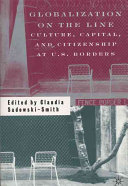
Globalization on the Line
By - Sadowski-Smith, Claudia,
Floor
-
Floor 1
Published
-
Palgrave, New York, 2002
ISBN 10 - 0312294832
ISBN 13 - 9780312294830
Book Status
-
1 Qnty Available with us.
Subject
-
Globalization
Shelf No
-
13
Call Number
-
303.4827 GLO
Physical Description
-
248 pages : illustrations ; 21 cm
Notes
-
Includes Index